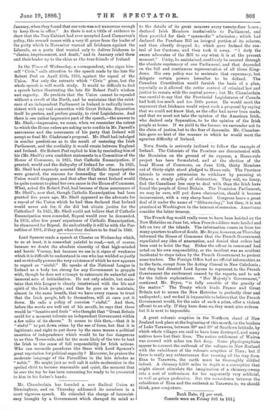In the Times of Wednesday, a correspondent, who signs him-
self " Gioia" calls attention to the speech made by the late Sir Robert Peel on April 25th, 1834, against the repeal of the Union. Not only the extracts which " Civis " gives, but the whole speech is well worth study. It would be difficult to find a speech better illustrating the late Sir Robert Peel's wisdom and sagacity. He predicts that the Union cannot be repealed without a revolt of the North, and he maintains that the exist- ence of an independent Parliament in Ireland is radically incon- sistent with any real connection with Great Britain. Separation itself he prefers, and prefers greatly, to rival Legislatures. And there is one rather impressive part of the speech,—the answer to Mr. Sheil,—impressive, we mean, when we remember the extent to which the Home-rulers are asking us to confide in Mr. Parnell's assurances and the assurances of his party that Ireland will accept as final Mr. Gladstone's proposal. Mr. Sheil had indulged in similar predictions as to the result of restoring the Irish Parliament, and the cordiality it would create between England and Ireland. Sir Robert Peel replied to him by reminding him of his (Mr. Sheil's) own confident statements to a Committee of the House of Commons, in 1825, that Catholic Emancipation, if granted, would end the disloyalty of Ireland for ever. In 1825, Mr. Sheil had expressly asserted that if Catholic Emancipation were granted, the reasons for demanding the repeal of the Union would disappear, and that after that event Ireland would be quite content to plead her own cause in the House of Commons. What, asked Sir Robert Peel, had become of these assurances of Mr. Sheil's, now that, though Catholic Emancipation had been granted five years ago, Mr. Sheil appeared as the advocate for a repeal of the Union which he had then declared that Ireland would never ask for, if she did but obtain justice for the Catholics P In 1825, Mr. Sheil could not believe that if Catholic Emancipation were conceded, Repeal would ever be demanded. In 1834, after five years' experience of Catholic Emancipation, he clamoured for Repeal. So undoubtedly it will be with the Par- nellites of 1891, if they get what they declare to be final in 1886.




































 Previous page
Previous page